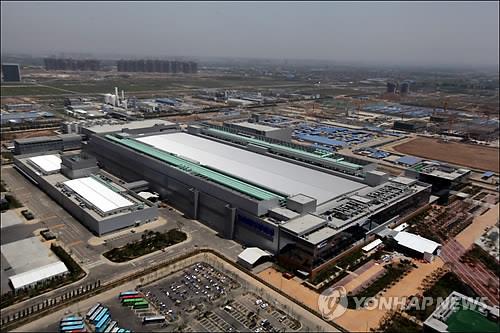- California Assembly OKs highest minimum wage in nation
- S. Korea unveils first graphic cigarette warnings
- US joins with South Korea, Japan in bid to deter North Korea
- LPGA golfer Chun In-gee finally back in action
- S. Korea won’t be top seed in final World Cup qualification round
- US men’s soccer misses 2nd straight Olympics
- US back on track in qualifying with 4-0 win over Guatemala
- High-intensity workout injuries spawn cottage industry
- CDC expands range of Zika mosquitoes into parts of Northeast
- Who knew? ‘The Walking Dead’ is helping families connect
Samsung’s Chinese chip plant in emergency mode during citywide anti-virus lockdown
Samsung Electronics Co. said Friday its memory chip complex in the Chinese city of Xi’an went into an emergency mode as the Chinese authorities enforced a lockdown to stem the spread of the coronavirus.
The South Korean tech giant said the emergency measure has not affected production, as it has been fully utilizing factory workers living in the company’s dormitory.
“The factory is currently fully operational,” a company’s official said, adding “We are closely watching the development of the situation” and the company is working on measures in case the lockdown drags on and starts to hamper production.
The city’s health authorities imposed stringent social distancing measures on Wednesday evening, requiring its 13 million residents to stay at home and banning nonessential travel or activities, to slow down the virus spread.
The company is said to be considering measures, such as having essential workers stay in the company’s facilities in order to minimize their contact with outsiders and consulting with the Chinese authorities to allow them to continue working.
Samsung Electronics has invested more than US$25 billion so far in the Xi’an manufacturing complex, Samsung’s only overseas facility that produces NAND flash memory chips.
The first plant began operation in 2014 and the second one opened last year. Combined, the Xi’an complex, which employs more than 3,300 workers, is estimated to produce about 40 percent of the company’s NAND flash products.
Samsung was the world’s biggest NAND flash provider with a 34.5 percent of market share in the third quarter, according to analyst firm TrendForce.

The file photo provided by Samsung Electronics Co. shows its semiconductor complex in Xi’an, China. (PHOTO NOT FOR SALE) (Yonhap)











